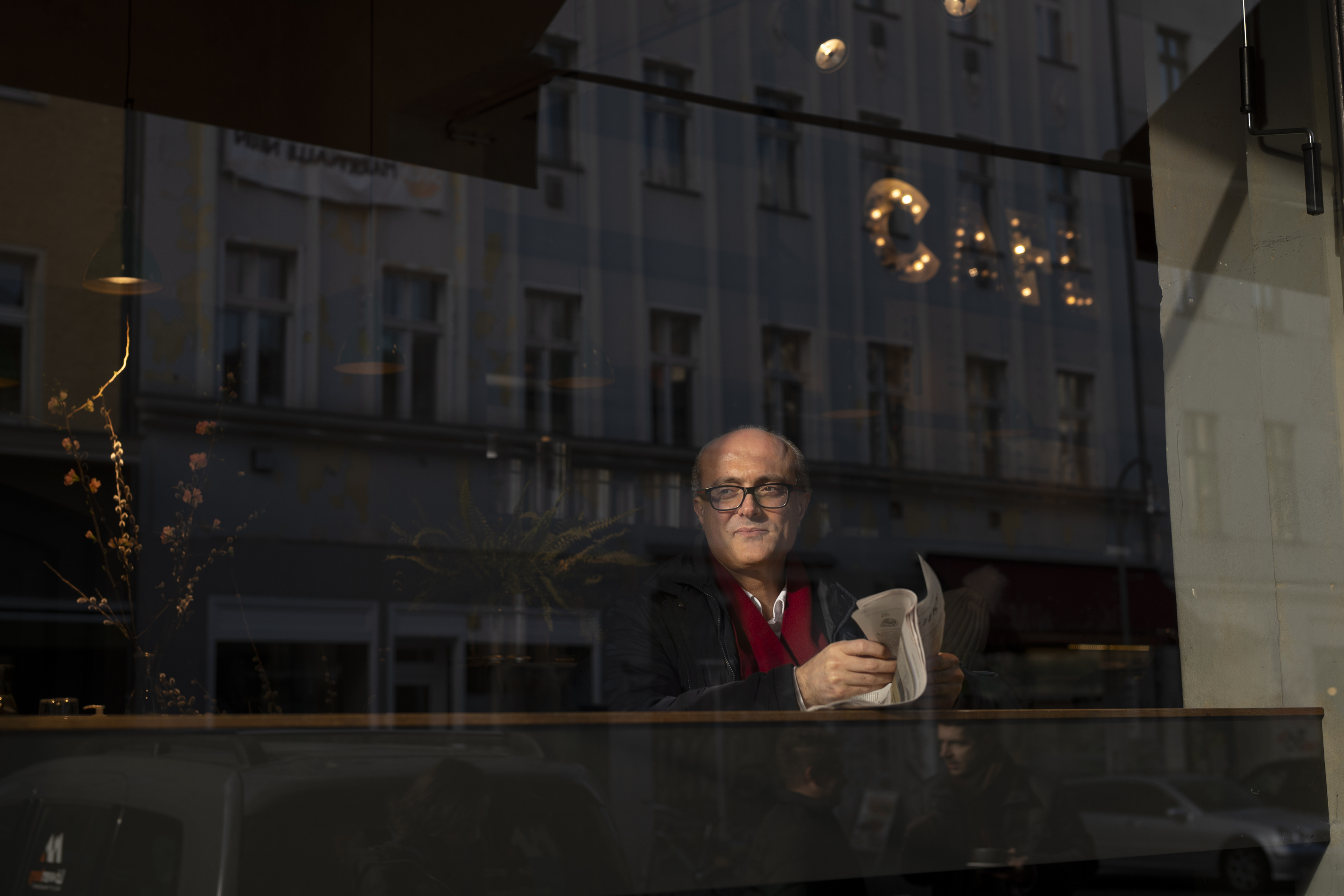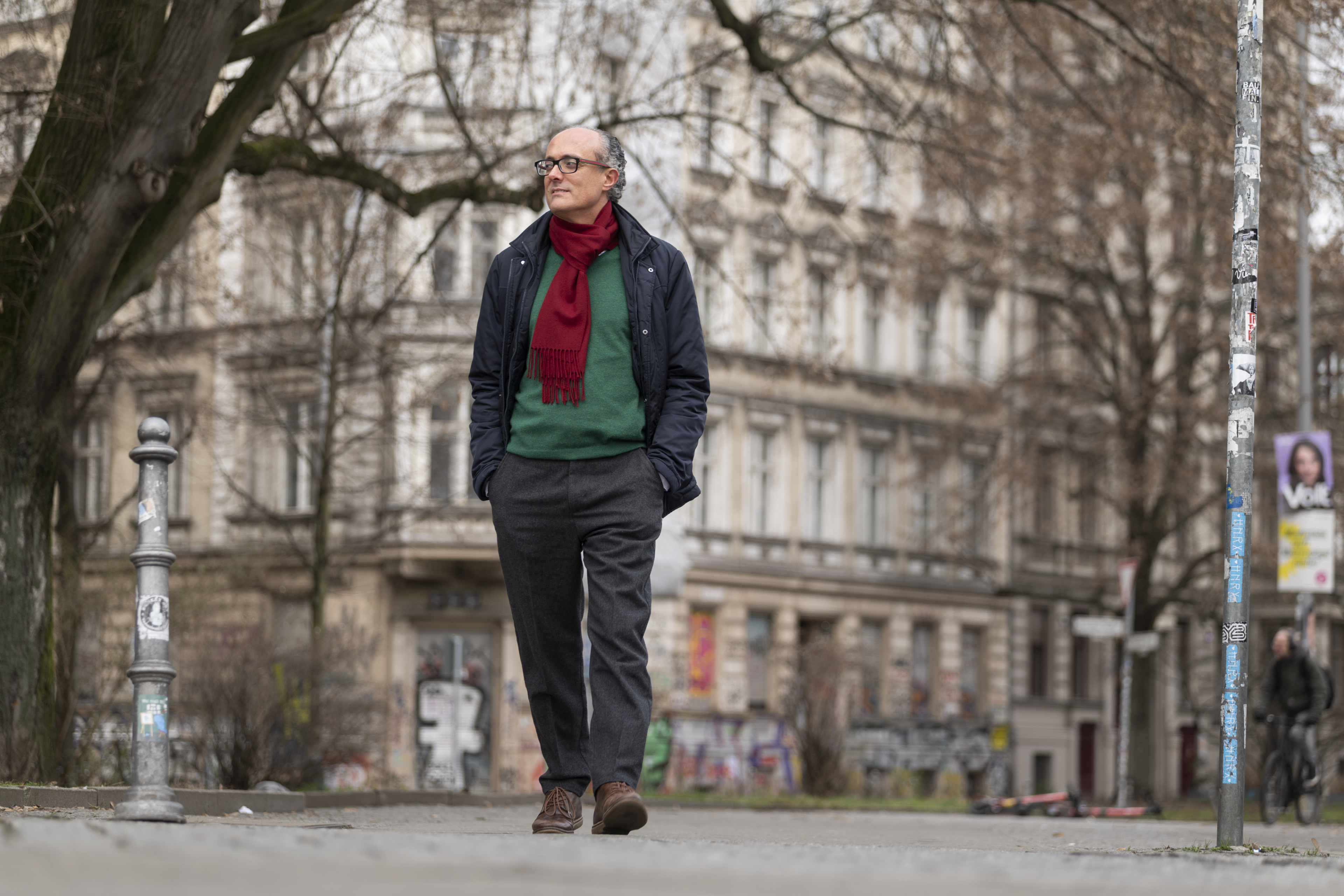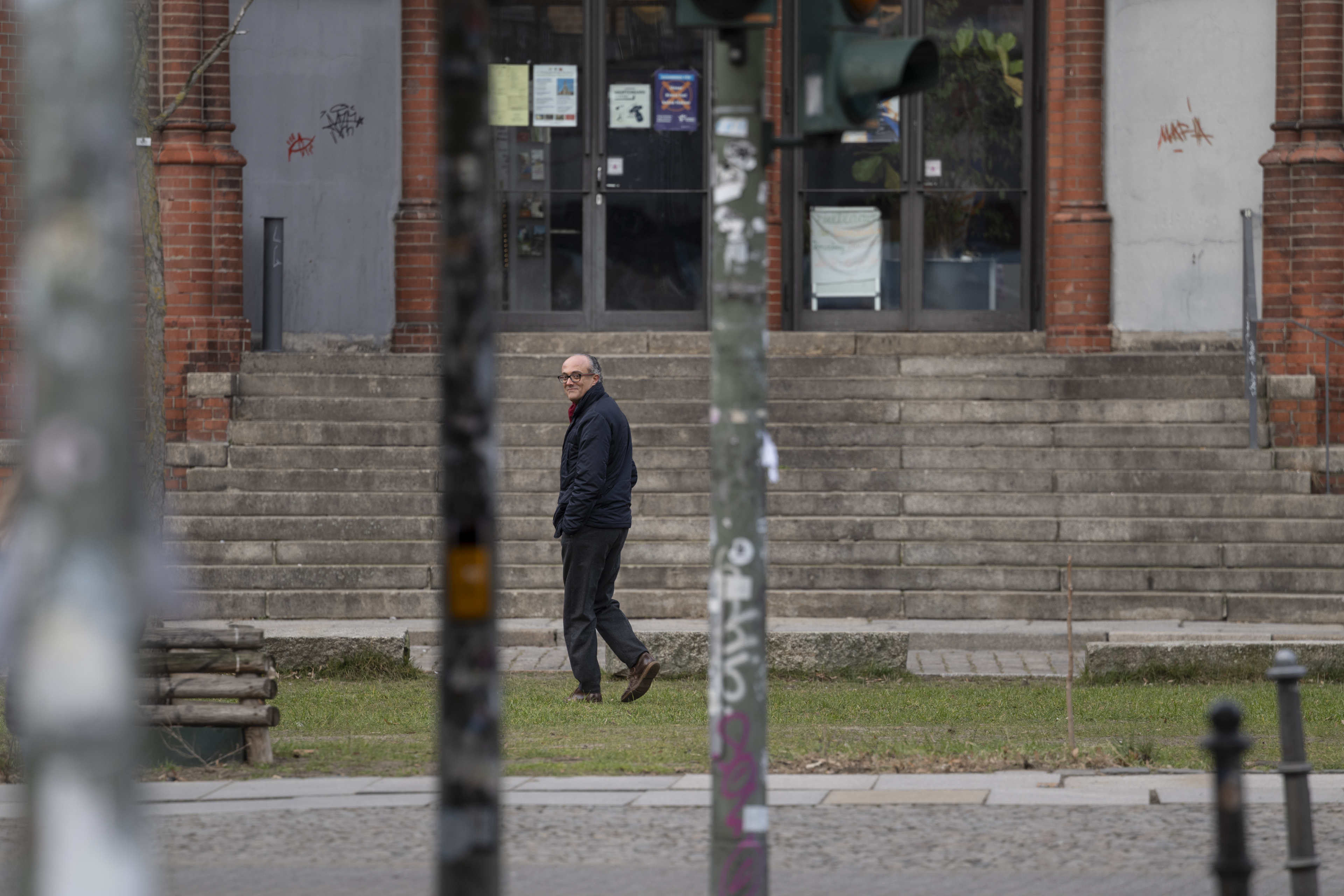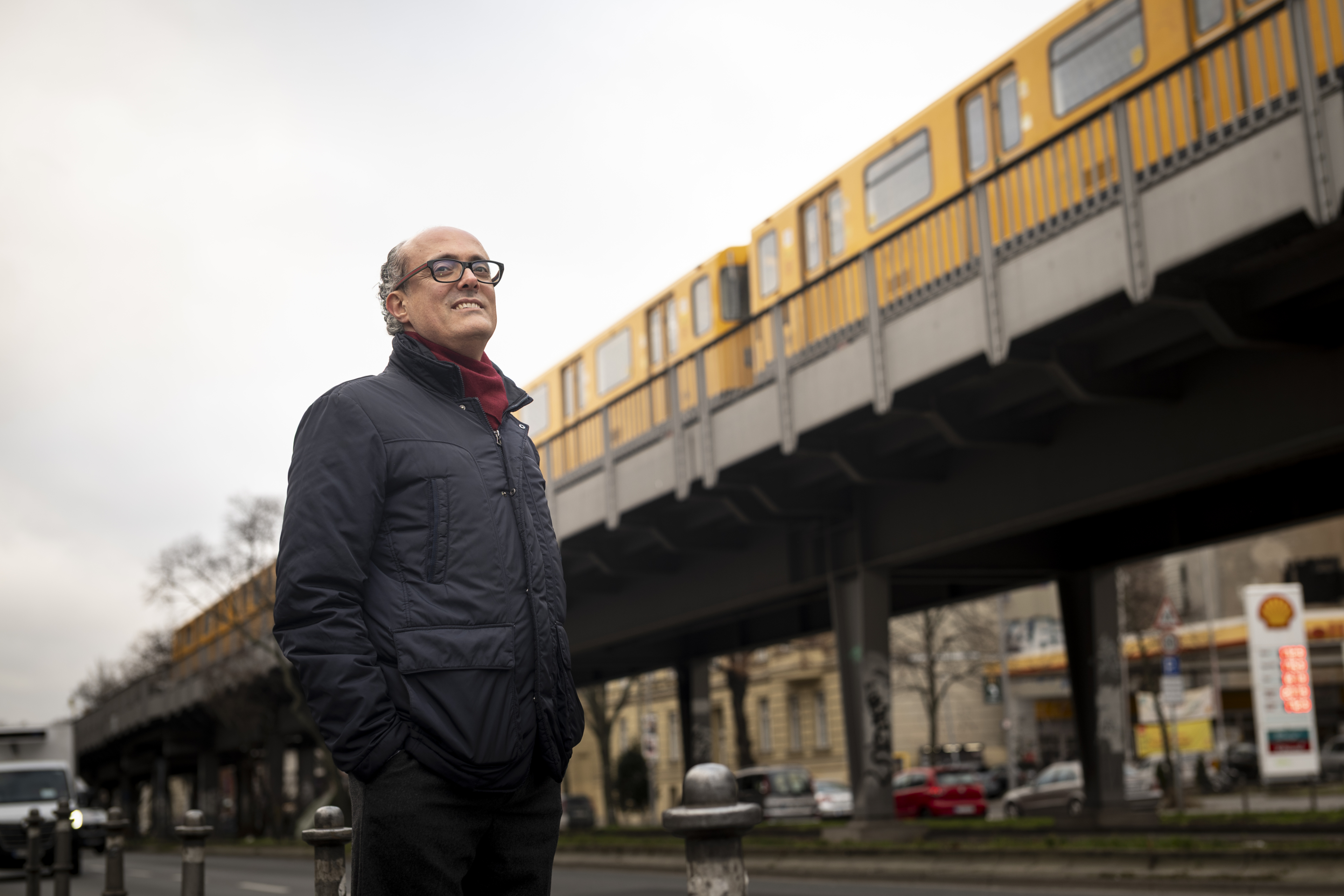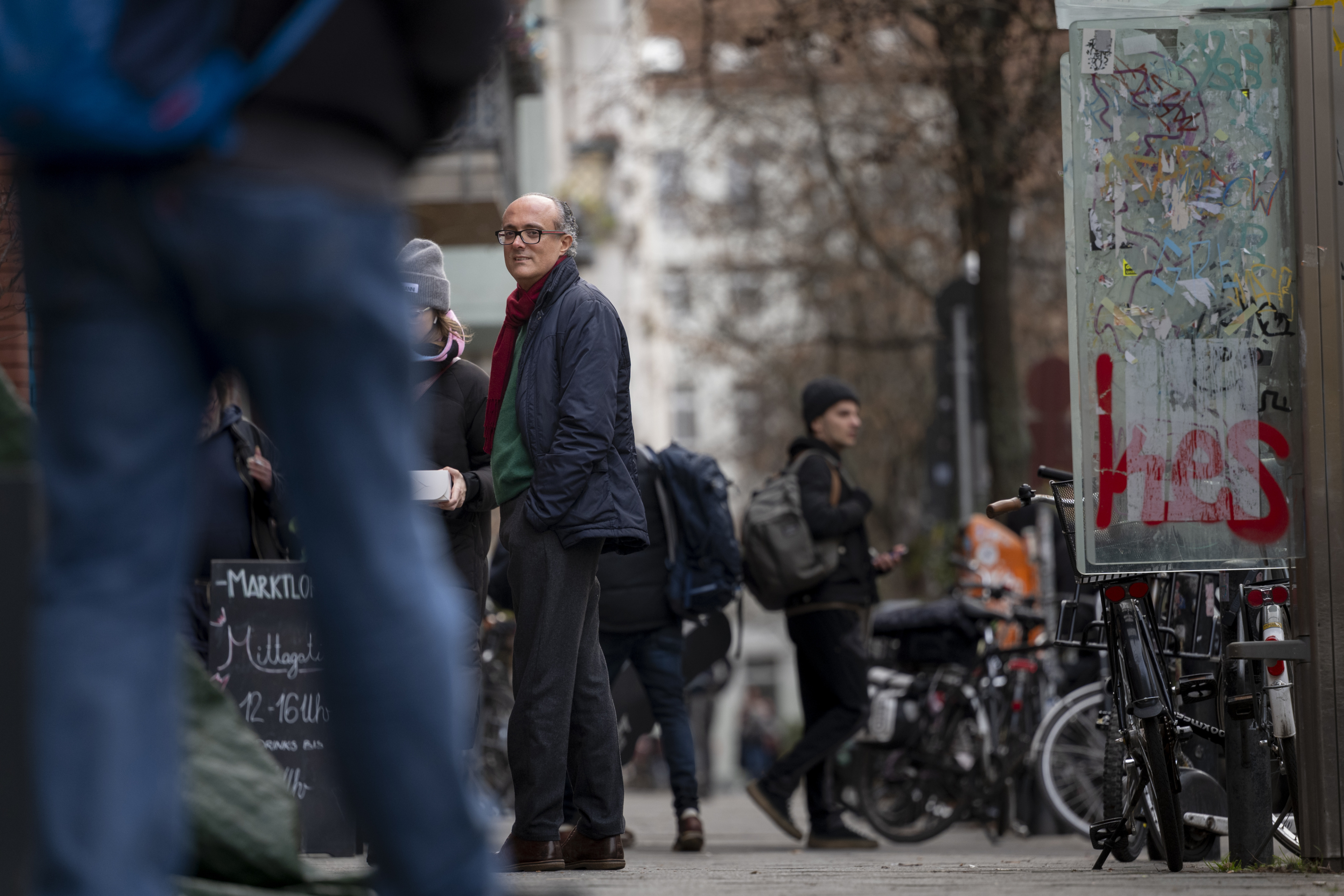Issue 20 / April 2025
I Look at the Entire Land
Sonja Zekri
In this interview the Palestinian political theorist Bashir Bashir talks about his model of “egalitarian binationalism.” He outlines a path to equal coexistence for Jews and Palestinians in Israel/Palestine and argues that the chance of a reconciliation can be the basis for a stable future
When I interviewed the Palestinian political theorist Bashir Bashir, Israel’s war in Gaza was 15 months old. Precipitated on 7 October by a Hamas attack that left 1200 dead and hundreds more displaced, it is now known that at least 48,000 Palestinians have died. Gaza lies in ruins. But now on this January day, for the very first time, an armistice seems possible. At the end of our talk at the Wissenschaftskolleg, the recording device now switched off, Bashir Bashir quotes a poem by Mahmoud Darwish, “Fi Fan al-Intithar” (“The Art of Waiting”). Then hours later, that very evening, the breakthrough comes and the guns will indeed fall silent . . .
Sonja Zekri: If a ceasefire really takes place, what would that mean for Gaza and the Palestinians?
Bashir Bashir: Anything that ends this genocide is welcome. The destruction and Israel’s atrocities against Palestinians in Gaza are unparalleled crimes in the 21st century. At the same time, and this is far more important, the last 15 months have also raised questions about the international order, international law, global politics, journalism, the arts, and the academic world. After the war on Gaza the whole world is different in certain respects. Maybe the world, surely important parts of the so-called “Western world,” should do some soul-searching.
SZ: Together with Amos Goldberg you co-edited The Holocaust and the Nakba: A New Grammar of Trauma and History, a book that is still not available in German translation. How do you, as a trauma expert, view this war?
BB: Well, people in Gaza live under especially traumatic conditions, but so do the vast majority of Palestinians. The research on memory, history and trauma is largely dominated by the centrality of the Holocaust which thus influences the way mainstream scholarship in memory and genocide studies has examined forms of political violence like genocides, expulsions and ethnic cleansings in different parts of the world. But this scholarship tends to be premised on the assumption that these events belong to the past. The Palestinians are a challenge to this assumption. Their oppression and suffering have been ongoing for decades. They are experiencing the Nakba, the catastrophe and national ruin, at this very moment. Israel is destroying the political and social backbone of the Palestinian people in Gaza, their infrastructure, universities, hospitals, schools. Israel isn’t waging war against the people of Gaza because they live there but because they are Palestinians and Gaza is part of Palestine, of Palestinian nationalism and identity.
SZ: But wait – the war was triggered by a Hamas terror attack on October 7th.
BB: The horrible Hamas attack was a turning point, of course, but one that the Israeli government was happy to exploit. Much older is the war waged by Israel’s colonial establishment and its eliminatory policies against both the people of Gaza and the wider Palestinian national movement. However, the question of Palestine is not just a Palestinian question or an Arab or even a regional question. It has another dimension that we can call “global Palestine.”
SZ: What do you mean by that?
BB: In the 1960s and 1970s the topic of Palestine was already one of global importance. At the time, the Palestine revolution encompassed art, cinema, poetry, but also armed struggle and terror. Vietnamese, Algerians, Germans, Japanese and many others were inspired by it and the Palestinians were in turn inspired by them. The Palestinians embodied those struggles for self-determination and decolonization, though the means of struggle used by Palestinians and others were not always morally defensible and politically productive. It was perhaps their greatest accomplishment after 1948 that the Palestinians managed to rewrite themselves into history as a nation after they had been misrecognized and disregarded – also by some Arab regimes. In the last 30 years, and at very least in the past decade, Palestine has again become a topic of global concern. Movements that lock horns with the global order and capitalism or fight for justice, human rights and democratic values – from Black Lives Matter to environmental issues to the rights of indigenous peoples – all reference Palestine. The war on Gaza has only intensified this. In the U.S., Germany, France, Great Britain and also in many Jewish circles, Palestine has become a symbol of justice, equality and freedom – a global metaphor.
SZ: That sounds like global significance, like influence, but the Palestinians aren’t able to convert symbolic capital into political capital. How can their cause be so easily ignored in international politics?
BB: The PLO has reached some important and remarkable achievements for the Palestinians internationally. There are some political successes, in the UN, in international law. But you’re right, for the past few decades the Palestinian body politic is fragmented and suffers from issues of legitimacy, representation, leadership and political vision. The Palestinian political system is weak and corrupt and needs to reinvent itself so that it enjoys greater legitimacy not only in the eyes of Palestinians but those of the world too. It needs to have a voice that doesn’t just talk about victims, that doesn’t simply reduce the Palestinians to those horrors pertaining to their situation. The Palestinians need to democratically reinvigorate and rebuild their national project and institutions. This would make their struggle for self-determination, justice and freedom more effective and appealing also globally.
SZ: Practically speaking, what does the glamour of being a global symbol do for the flesh-and-blood Palestinians?
BB: It is not about glamour. It is an enormous help both emotionally and ethically speaking. When you look at naked power relations, the Palestinians have every reason for pessimism. All of them know moments of darkness, depression and despair. Actually you would expect them to be utterly disconsolate and give up. But they don’t. They are resilient, also because of the justness of their cause and the global empathy and solidarity.
SZ: When you speak with Palestinians in the West Bank, East Jerusalem or Jaffa, you sense that they are greatly unsettled by the present situation, but they also convey an astonishing optimism that looks to the future. And international solidarity is often cited as one of the reasons for this.
BB: Yes. But Palestine has also become global in other respects. Israel brags about being a high-tech nation and uses us Palestinians individually, collectively, geographically and psychologically as a testing ground for its surveillance technologies and oppressive colonial policies – our bodies, our bedrooms, our psyches serve as sites of experiment for the development and application of these technologies and policies. And these colonial surveillance technologies are being purchased and deployed by other governments, autocrats, and also democratic governments. Palestine discloses this nexus as well. Put differently, this alarming way of circulating and spreading Palestine through surveillance technologies and oppressive colonial policies is very dangerous and needs to be unmasked and interrogated. Incidentally, in the hands of autocrats, and recently unfortunately democratic regimes too, these surveillance technologies and oppressive colonial policies become a mighty weapon.
SZ: That would be an undesirable side effect.
BB: Global Palestine exposes the liberal order. Rulers like Vladimir Putin can now say to the West: “Take a look at yourselves and don’t talk to us of human rights.” Of course dictatorships like those in China or Russia are repulsive, but I also criticize the hypocrisy and double standards of the Western liberal order. Global Palestine is embarrassing to Germany, for instance, because it reveals the hypocrisy of its government’s policies.
SZ: Is it your impression that German politicians are receptive to this?
BB: At some point Germany has to consider its international reputation. Post-reunification Germany perceives itself as strongly committed to democratic and liberal values. In the past decades one might argue that Germany largely lived up to this self-perceived image. Nowadays, in light of Germany’s almost blind support of Israel, when German diplomats speak of democratic values, they are necessarily rebuked in the social media of the global South: You’re not here to preach to us about democracy. That’s the unmasking power of global Palestine. Whether this will pay off for the Palestinians – nobody knows. But think back to the time before October 7th. There’s no doubt as to the revolting nature of those Hamas crimes, but it should also be noted that prior to this date the Palestinians and their rights were in danger of being overlooked and neglected as processes of regional normalization between Israel and some Arab regimes were promoted by the U.S. and Europe.
SZ: One of the central concepts of your research is “egalitarian binationalism.” If we can stay in the present for a moment – what role might it play for a postwar Gaza?
BB: Let me first briefly and non-exhaustively present “egalitarian binationalism.” The notion refers to an ethical frame that recognizes and promotes the existence of two national groups with equal rights to national self-determination. Egalitarian binationalism represents a bold departure from most of what has thus far dominated the political discourse on Israel/Palestine. It insists that political solutions for Israel/Palestine should be based on equality, parity, reciprocity, cohabitation, mutual legitimacy, decolonization, and dismantling all forms of Israeli-Jewish privileges and supremacy. Egalitarian binationalism is applicable everywhere in Israel/Palestine, including Gaza. For far too long, political solutions in Israel/Palestine have been sought by means of separation, fragmentation and segregation. When I examine the rights of the Palestinian Arabs and Israeli Jews, I look at the entire land between the Jordan River and the Mediterranean Sea. But egalitarian binationalism is not a political solution; rather, it is an ethical principle that should guide any political solution and process of historical reconciliation in Israel/Palestine.
SZ: How can this miracle occur? After October 7th, both Israeli society and Palestinian society have become colder, more irreconcilable and even more hateful toward the other.
BB: You are right! Decades of occupation and violence have generated hatred and frustration, not willingness and desire for egalitarian joint-dwelling. But let’s look at the situation in a deeper way. On the one hand you have a colonial power, Israel, and on the other a largely colonized nation, the Palestinians, who resist – through also, but not only, resorting to violence – this colonial constellation. What follows from this asymmetrical violent colonial setting? After decades of asymmetrical conflict and violence and 15 months of war, one of the saddest, most brutal and dramatic realizations is that Palestinian Arabs and Israeli Jews have no choice but to live together. Neither side can annihilate the other. But if we take this as the first reasonable observation – and in my view we should – we arrive at the second observation that, by the standards of international law and diplomacy, these are the fundamental rights of Palestinians that are being violated, not of the Israelis. If we take the first and second observation together then we are forced to conclude that both peoples must live together, and the present conditions are problematic. It’s in this situation that egalitarian binationalism can offer a way out.
SZ: The egalitarian principle is immediately obvious, but why the recourse to nationalism?
BB: The basic assumption is that “from the river to the sea” entails two nations – Israeli Jews and Palestinian Arabs – for which international law provides the right to self-determination. Indeed, there are certain communities in Israel/Palestine such as the Armenians and Druze that are also entitled to certain communal rights, but not in the same measure as nations. Nationalism is a central component of both Israeli Jewish and Palestinian Arab identities. Ever since the days of the Balfour Declaration in 1917, the Palestinians have largely been subject to denial, negation and misrecognition when it comes to their national identity and them constituting a nation. The emergence of Jewish-Israeli nationalism, for its part, is bound up with a European hatred of Jews and the failure of European nationalism to accommodate its Jewish citizens. Yet the Jewish national awakening in Europe found its expression not only in Zionism. “Der Bund” was initially far more important and influential than Zionism . . .
SZ: . . . founded in 1897 in Vilnius as the “Allgemeiner jüdischer Arbeiterbund für Polen und Russland” (General Jewish Labor Bund in Russia and Poland) . . .
BB: The “Bund” also propagated Jewish national identity and rights but saw the future of the Jews in Europe, not in Palestine.
SZ: The advantages of your approach for the Palestinians are obvious. Compared to their present situation, they can only come out ahead. But what does it offer Jewish Israelis?
BB: First of all, my ideas are not uncontroversial among Palestinians either. But let’s take a look at Zionism. It revolutionized modern Jewish life, it was enormously successful in certain respects. It promised Jews a national homeland and then created it. But one of the most important inducements of Zionism was the normalization of Jewish life, becoming a “nation like all others,” as the saying goes. Israel has achieved tremendous things in culture, economy, high-tech, in the military. But as soon as Israelis see a Palestinian flag, hear Arabic being spoken or bump up against whatever sign of Palestinian identity, then even for the liberal-minded amongst them there is a moment of disruption. After more than seventy years of existence nothing is normal in the State of Israel. And egalitarian binationalism can possibly change that. It offers what the Israeli Jews lack the most, namely normalization and legitimacy in the eyes of their victims. Only the Palestinians, through realizing their national rights, can profoundly and meaningfully grant this legitimacy and normalization to Israeli Jews.
SZ: Security in Israel was an absolute priority before October 7th but especially so afterward. Do you take this into account?
BB: Within the frame of historical reconciliation and decolonization, it’s fine with me if Israeli Jews want to be dominant in the military or have a veto on defense issues. But I refuse to conceive of security only in the categories of military, might, weapons or police. Israel is currently one of the most dangerous places in the world for Jews. Yet it has no legitimacy in the eyes of its victims. And in the final analysis, even after October 7th, even after the destruction of Gaza, we are left – thus far at least – with a very simple fact – between the river and the sea live around seven million Arabs and seven million Jews. And the Arabs might soon become the majority. And they won’t leave their homeland. This place is so tiny and so complex, the lives and societies are so intertwined, that it is impossible to separate them. Egalitarian binationalism precludes any kind of ethnically exclusive nationalism in the classic sense. Besides seriously addressing the core issues of the conflict like self-determination, refugees and Jerusalem, egalitarian binationalism offers many practical solutions for environmental issues, sanitation, the water supply etc. So why not implement values and norms that transform this space from a regime of apartheid, Jewish supremacism, fear and segregation into an integrative, inclusive form of egalitarian cohabitation? Based on equality, parity, mutual legitimacy, the redistribution of resources and – this is an imperative in my mind – decolonization. Briefly, egalitarian binationalism, I think, is one of the most feasible and convincing alternatives to military occupation, violence, hatred, apartheid, ethnic cleansing and genocide. While the former is guided by ethical norms and democratic values, the latter is by supremacy, mere power and belligerence.
SZ: Your approach provides for a right of return for Palestinians but not for Jews. What’s so just and equal about that?
BB: The Palestinians were not displaced by an earthquake or persecution in Europe. The Palestinians should and will insist that Israel acknowledges its responsibility for the expulsion of the Palestinians and the creation of Palestinian refugees as well as for the right of return and reparations for these refugees. But these questions of Palestinian refugees and their return have long been discussed in scholarship, and briefly in past negotiations, at the principled and practical levels, I haven’t added anything new. And I’m not blind, I’m well aware of the antisemitism in many parts of the world. Antisemitism is repulsive. It is real, dangerous and ought to be fought. Any future constitution for Israel/Palestine should of course make provision for threatened Jewish communities and offer them if necessary safe haven in Israel/Palestine. Neither Palestinians nor Israeli Jews should be treated like a minority in Palestine/Israel. But that’s something different from the current entitlement whereby any Jew, no matter where they live in the world, can become an Israeli citizen enjoying more rights and privileges than the indigenous Palestinian Arabs.
SZ: The political form, the system of government remains open. But would it be a democracy?
BB: Of course.
SZ: Do we have any role models today?
BB: I’m suspicious of the notion of role models. But there is a lot that can be gained from comparisons with other cases that show similarities and differences. I think we can definitely find some inspiration in the cases of Switzerland, Belgium, Canada, Great Britain – to name just a few. But Israel/Palestine can also become an unprecedented case on its own merits. History is full of examples and struggles that were perceived as utopian and idealist that later proved practical and feasible. Palestine/Israel is not and shouldn’t be an exception.
SZ: These days many Palestinians, but also Arabs and Muslims feel very alienated in Germany, they find the atmosphere hostile. Germany’s “unconditional solidarity” with Israel allows little room in politics for empathy with the Palestinians. Did you hesitate before accepting the invitation to Berlin?
BB: The Wissenschaftskolleg is a place of rich, stimulating, and fruitful international intellectual exchange. And I was interested in meeting up with German intellectuals. Some of them, after conversations and exchange, were able to reflect once more on the whole situation. You know, I actually think Palestine can be a source of hope for Germany, particularly to those in Germany who hold dear the democratic and liberal values of equality, justice and freedom. Values that are at the core of the Palestinian struggle.
SZ: How so?
BB: In some milieus here in Germany, people have settled into a kind of “economy of guilt.” They absolve themselves of German responsibility through blind support of Israel. Maybe there’s something comforting in that. But this economy breaks down when the Palestinians come into play, they expose this mechanism. Europe, and especially Germany, has outsourced the “Jewish question” to the Middle East – at the expense of the Palestinians. Whether Germany likes it or not, and as it has become so visible during the recent events in Palestine/Israel, the question of Palestine is also a German question! It is mainly thanks to the antisemitism of Christian Europe and the Holocaust that the Jewish question and the Palestine question have become inseparable, and somehow one tragic and inextricable one.
More on: Bashir Bashir
Images: © Maurice Weiss

